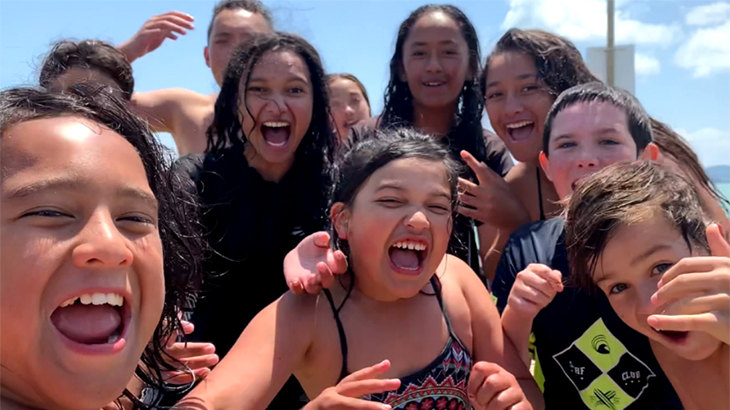Supporting New Zealanders to enjoy water safely

We want New Zealanders to enjoy their time in and around water, and to stay injury-free. That's why we work with Water Safety New Zealand.
Growing up in New Zealand, you are almost twice as likely to drown compared to living in Australia.
It's a sobering statistic. Drowning is the leading cause of recreational death in Aotearoa.
New Zealand's fatal drowning rate is 1.8 per 100,000 people which is at the higher end of OECD countries. ACC also spends more than $72 million a year on water-related injuries.
ACC Injury Prevention Leader Kirsten Malpas says it's the Kiwi way of life to be in and around the water but it's an issue that needs addressing.
"The statistics show we've got more work to do to help New Zealanders understand the risks and keep our whānau safe around water," she says.
In 2020 there were 74 preventable drowning fatalities – down slightly on the 82 fatalities in 2019. The five-year average (2015 – 2019) is 81 drownings per year.
"A drowning is a devastating event for any whānau and community and these incidents are preventable – if you stop and take time to assess the risks."
In 2020 there were
We helped
And we helped over
Last year ACC helped 27,892 people recover from injuries in and around water. That's about 76 claims a day from people out enjoying activities like surfing, fishing and swimming.
Data released this week shows that in the past three months (December 2020 – February 2021) alone there have been 12,379 water-related injuries. These have come at a cost of over $20 million.
This compares to 12,945 (last summer), which came at a cost of $18 million.
"This cost shows why we need to partner with Water Safety New Zealand and help prevent as many water-related injuries as possible," says Kirsten.
"We're huge supporters of people getting out and following their passion, whether that’s time with the whānau by the beach or fishing at their favourite spot on the river.
"We want people to enjoy life knowing that ACC is supporting them to stay injury-free and to get back to everyday life when things go wrong."
We partner with Water Safety NZ to keep children safe in and around water, as the new naming rights sponsor of the ACC Water Skills for Life programme.
Sheridan Bruce, Water Safety New Zealand Strategic Partnerships and Communications Manager, says the programme teaches kids how to have fun and keep themselves safe in and around water.
"Knowing how to swim is not enough, Water Skills for Life teaches other life-long water safety and survival skills," says Sheridan.
"While we still teach the fundamentals of swimming, we also want to address the fundamentals of being safe around the water. So that's skills like learning how to float on your back, on your front, getting into a huddle position if you're with a group, making sure you're wearing a life jacket on the boat and knowing how to use one in the water, learning how to scull and tread water.
"All those skills we teach in Water Skills for Life. They are critical skills that could save your kids' life."
In 2020, ACC helped over 200,000 children learn these critical water safety skills. Since July 2017 there have been 757,242 tamariki complete the programme.
The data shows males are four times more likely to drown in New Zealand, making up 84% of total drownings.
Improving water safety for Māori
Māori are also overrepresented in New Zealand's annual drowning statistics.
On average Māori account for around 25% of all preventable and non-preventable drowning fatalities, despite comprising only 15% of the nation's population. On average around one in four New Zealanders who drown are Māori.
The Kia Maanu Kia Ora (KMKO) water safety programme, which is funded by ACC in collaboration with Water Safety NZ and Tangaroa Ara Rau is a two-year pilot (2019 - 2021), to address this issue.
The programme uses Dr Chanel Phillips' Wai Puna water safety framework.
In 2019/20 11 kaupapa Māori education and skills programmes were funded to deliver a wide range of water safety programmes. This increased to 18 programmes in 2020/21.
"We need to improve water safety outcomes for Māori and there’s a real need for culturally appropriate interventions created and delivered by Māori for Māori," says Kirsten.
"The Kia Maanu Kia Ora water safety programme is looking to achieve these outcomes."
More information
Children aged from 5 to 13 can participate in Water Skills for Life training, which is taught either at school or at a local pool by a school teacher or swim instructor. It teaches children the skills for life-long water safety, to keep themselves safe and keep an eye on their mates in, on and around the water. We're the main partner with Water Safety NZ for Water Skills for Life.
We also support Kia Maanu Kia Ora. It's a kaupapa Māori water safety programme run by Māori for Māori.
The Swim Reaper campaign is designed and run by Water Safety New Zealand. It aims to make young people stop and think before they make bad decisions with potentially deadly consequences. Most drownings are preventable and Swim Reaper is designed to try and bring that number down by targeting the most at-risk groups. As the Swim Reaper says: "Swim dumb and you're done."




